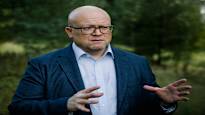Washington’s outgoing ambassador Mikko Hautala visits Ykkösaamu. He predicts that the result of the US presidential election will affect, among other things, defense and trade policy.
The US presidential election is more than two months away, and the odds are even. Opposite are the Republican candidate Donald Trump and the Democratic nominee Terrible Harris.
Regardless of who wins the race, Europe is also interested in how the election result will affect different political blocs.
– The election result will be reflected in defense, trade policy, climate policy and many other issues. The depth of the impact varies in different sectors, estimates the ambassador, who will finish his term in Washington in August Mikko Hautala.
According to Hautala, part of it can perhaps be influenced through negotiations, but some consequences have to be reacted to or adapted to.
Particular concern in Europe is related to a possible change in the policy of the United States to support its European allies in European crises. Hautala calms worries.
– I do not consider a fundamental change in the transatlantic relationship likely. The main reason for this is that a radical change in the relationship is not in the US’s own interest.
The ambassador has a clear justification for that.
– The global alliance system is the most significant asymmetric advantage of the United States in the great power competition. Its significant weakening, let alone its scrapping, would be roughly geopolitical suicide.
There are differences and similarities between Trump and Harris
According to Mikko Hautala, both candidates are aware of Europe’s importance in the United States’ global alliance system.
– Since, in the eyes of the United States, the biggest risks are related to the strengthening of China, both candidates strive to increase Europe’s responsibility for its own defense. Trump would do this with tougher tactics, he estimated.
Hautala repeats the US policy change that has already been internalized in Europe, at least partially.
– Whichever candidate wins, Europe is expected to do more, and behind this demand is the majority of the parties of both candidates.
According to Hautala, especially those European countries whose defense spending does not reach the two percent level decided by NATO would be hit hard.
He says that in terms of trade policy, both candidates emphasize strengthening US industry and push protectionist policies.
– However, this does not prevent trade or significant technological cooperation, because the United States also needs these.
The future policy of the USA in Ukraine is shrouded in darkness
The presidential election increases the uncertainty of the situation in Ukraine, because there is no certainty about the volume or the long-term nature of US support until the policies of the post-election administration, says Hautala.
– Based on the election campaigns, it seems likely that Trump would try to pressure the parties into peace, is the ambassador’s assessment.
As for Harris, Hautala expects that there will be no major changes to the current line.
Peace between Russia and Ukraine is featured in many discussions
According to Hautala, the pressure to seek peace has increased globally, as the war has extensive negative spillover effects. In this sense, the lively discussion about peace is understandable.
– However, it is important to be aware that many parties promoting peace talks have their own goals, where Ukraine’s interests are not necessarily considered, says Hautala.
When talking about peace, we should also talk about the conditions of peace and the position of Ukraine after peace.
– I don’t see Russia giving up its political goals regarding the war, the most important of which by far concerns Ukraine’s future status as a state, Hautala estimates.
He reminds that for Ukraine it is ultimately about the viability of the state and the future of Ukrainians.
– Without a change in Russia’s basic positions and readiness to seek peace from another basis, I consider the conditions for a lasting peace to be low.
